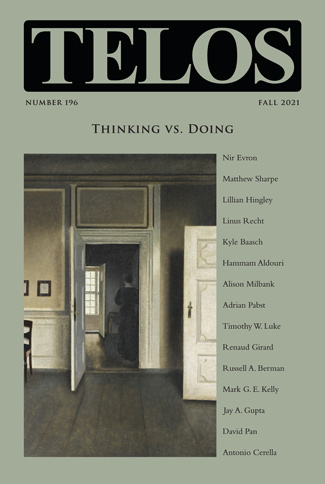In today’s episode of the Telos Press Podcast, David Pan talks with Matthew Sharpe about his article “Solitaire/Solidaire: Camus, Contemplation, and the Vita Mixta” from Telos 196 (Fall 2021). An excerpt of the article appears here. In their conversation they discussed the ways Albert Camus engaged himself politically during his life; how Camus justified his aesthetic work in relation to his political activity; how he responded to critiques of his focus on contemplation rather than political engagement; and how he understood the relationship between aesthetic contemplation and philosophical contemplation. If your university has an online subscription to Telos, you can read the full article at the Telos Online website. For non-subscribers, learn how your university can begin a subscription to Telos at our library recommendation page. Print copies of Telos 196 are available for purchase in our online store.
|
In today’s episode of the Telos Press Podcast, David Pan talks with Lillian Hingley about her article “The Feminine Character: The Allegory of Ibsen’s Women in Adorno’s Modernist Literary Theory” from Telos 196 (Fall 2021). An excerpt of the article appears here. In their conversation they talked about Adorno’s idea of the “feminine character” and how it relates to his broader critique of capitalist society; Adorno’s reasons for focusing on the women of Ibsen’s plays; the ways that Adorno uses the idea of allegory to interpret Ibsen’s work; how Adorno links individual tragedy to more general structures of alienation; and whether Adorno is trying imagine a world without tragedy or, alternatively, if tragedy for Adorno is just a part of human existence. If your university has an online subscription to Telos, you can read the full article at the Telos Online website. For non-subscribers, learn how your university can begin a subscription to Telos at our library recommendation page. Print copies of Telos 196 are available for purchase in our online store. It is probably prudent to start with a clear affirmation that the pandemic is real, that COVID-19 has taken many lives, and that public health measures have been necessary to try to limit the devastation of the disease. No denying here. But it is also evident that the messaging by health authorities has often been confusing, and that has undermined their own credibility: for example, in the shift from initial advice against wearing masks to the current (if inconsistent) mandate to do so. If the science on a particular question is not fully settled, it might be better for the authorities to be honest about that indeterminacy rather than to lay claim to an infallibility they cannot maintain. That clarity, however, would mean a willingness to trust the public to think on its own and to act in the spirit of individual responsibility, instead of issuing orders and vilifying critics. The following essay first appeared in Achgut.com on September 18, 2021, and appears here with the permission of the author. Translated by Russell A. Berman, with comments here. From the very start of the pandemic, corona and climate change have always been mentioned in the same breath. Indeed, the parallels are unmistakable. In both cases it is a matter of invisible threats from natural phenomena. In both cases, the discussion is shaped by scientists with data and modelings that are difficult to follow, as they demonstrate the need to limit personal freedoms. In both cases, large parts of the population submit to these prohibitions and limitations on freedom. In both cases, we have seen radical movements emerge, like Fridays for Future, Extinction Rebellion, and Zero-Covid, that demand even more extreme measures, reminiscent of charismatic conversion cults and chiliastic sects. In both cases, “deniers” and “skeptics” are denounced as dangers who stand in the way of preventing a catastrophe. After the COVID lockdown, a climate lockdown will take place, with the one transitioning into the other seamlessly. Today’s episode of the Telos Press Podcast features our recent panel discussion on the causes and consequences of the U.S. failure in Afghanistan. With presentations from Telos editors Mark Kelly, Adrian Pabst, Marcia Pally, David Pan, and David Westbrook, the discussion covered various aspects of the U.S. withdrawal from Afghanistan as well as its implications for the future of the region, the promotion of liberal democracy and human rights, and the influence of the United States and the West more generally. We were also delighted to be joined by our listeners from around the globe, who posed thoughtful and provocative questions to the panel following the presentations. The discussion picked up on a number of arguments addressed at greater length in the “Forum on Afghanistan” featured in Telos 196 (Fall 2021), our new issue, which is now available in the Telos Press store. Links to the individual articles are also provided here. If your university has an online subscription to Telos, you can read the articles at the Telos Online website. For non-subscribers, learn how your university can begin a subscription to Telos at our library recommendation page. Telos 196 (Fall 2021): Thinking vs. Doing is now available for purchase in our store. Individual subscriptions to Telos are also available in both print and online formats.
|
||||
|
Privacy Policy · Data Protection Copyright © 2026 Telos Press Publishing · All Rights Reserved |
||||



